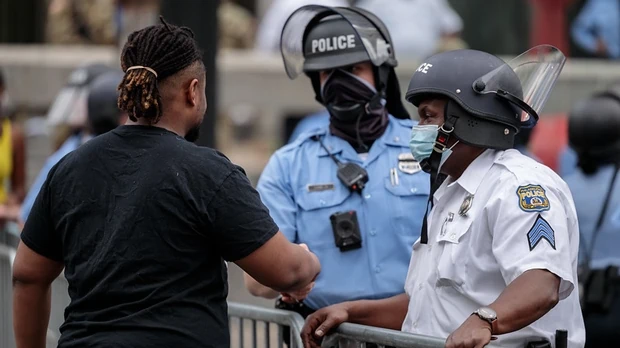
by Mark Oppenheim
The need to communicate and work together is nowhere better expressed than through the following Washington Post Piece authored by John Woodrow Cox, below quoted in its entirety.
I was speaking yesterday with a 27 year veteran of the San Francisco Police Department working on the front lines of demonstrations, some of which turned violent. We talked about how he is helping younger officers deal with the stress of being blamed by protesters for the killing of George Floyd and other black men, which the officers themselves deplore. The officer in San Francisco is white, the officer in DC whose words are cited in the article below is black. Both are professionals dedicated to preserving a strong civil society. Both are doing their best to do right.
Allies of a strong America, an America that respects diversity and grapples with the injustice of racism and disparities based in race, must come together. Protesters and law enforcement must stand united in this.
– Mark Oppenheim
_____
By John Woodrow Cox, Washington Post
June 4, 2020 at 9:49 a.m. PDT
“I realize that in police departments across the nation, across the world, there are racists in those police departments,” said the officer, who declined to provide his first name but whose uniform read R. Watts.
True change, he insisted, could come only from the inside.
“This country did not want us, but yet there were people who fought anyway. Now we got spaces here,” he continued, pointing over his shoulder at the Capitol building, a symbol of American power that enslaved people were forced to help build more two centuries ago.
“A man just four years ago was in a White House that wasn’t designed for him. You have to start somewhere.”
The conversation came a half-hour after another group of protesters had descended on the green lawn and, quickly, became enraged at Watts and his comrades. As an organizer shouted names off a list of black men and women who had been killed by police, a police radio crackled, interrupting the reading. The man with the megaphone asked the officer turn it down, but he ignored the plea.
“You would have done it for the national anthem!” a woman yelled.
“That’s exactly why we’re here,” another shouted.
Now more protesters were there for the same reason, but this time, they’d found someone who wanted to listen.
“You have officers across the country who have never even dealt with black people … so if I quit and then all the police department is white, how does that help?” Watts asked.
“It doesn’t,” answered Dameece Neal, who was sitting on the stone wall, facing Watts.
“It doesn’t,” Watts affirmed.
He explained he was the father of four kids — ages 2, 10, 14 and 16 — and that’s why the job he chose, and continued to do, mattered.
“I was black before this,” he said, tugging on his uniform. “When I’m off duty, I’m black. But not only am I black, I’m black with this on my hip with a T-shirt over it.”
He pointed at his gun.
“When I get pulled over and I’m a cop, I have to let that other cop know, ‘Look guys, I have a weapon on me and my wallet’s back here. Is it okay if I reach for it?’ ” he told the protesters. “I say that because I know I’m black. I know I’m black before I’m anything else. And I’m going to be black after this job.”
He told them he wouldn’t say all police were good or that even most were. Some were not good people. Until you deal with one, you can’t know.
“But I’m not that, and I have many brothers standing next to me who are not that,” he said. “We understand that nobody should lose their life for a petty crime. … You write a bad check, and you’re dead? From a bad check, really?”
Another protester interjected, granting Watts might be a good officer — but what about all the others who aren’t?
“What are you doing?” Neal added.
“If I see it’s wrong, I will speak up,” he said. “And I do.”
Neal, 22, nodded and kept listening. The recent college graduate had grown up in D.C. and never had a conversation like this one before — “not with a police officer” — but this is what she had longed to hear.
“My heart walks with you guys because I’ve been this,” Watts told them, pinching his skin, “since the day I came out of my mama. … I’m proud of each and every one of you guys.”
“Keep marching,” he continued. “Do it for me. Do it because right now I’m here and I can’t do what you’re doing. But understand, my heart is over here with you guys.”
____
Mark Oppenheim is a nonprofit wonk who runs nonprofit search and media organizations.
mOp-Ed pieces reflect diverse opinions about the nonprofit world and we welcome yours. If you would like to be a guest writer for mOppenheim.Org, please contact us for more information
